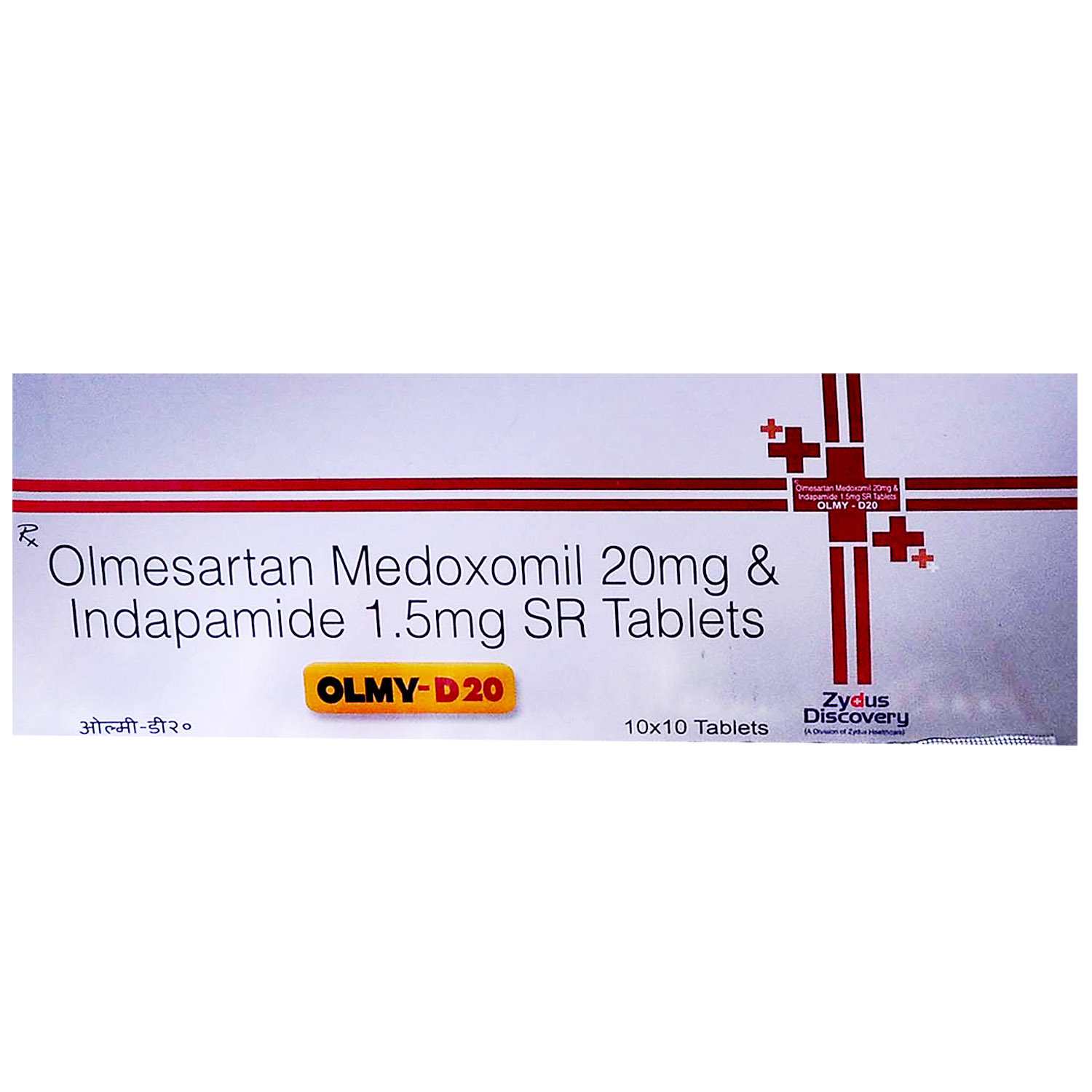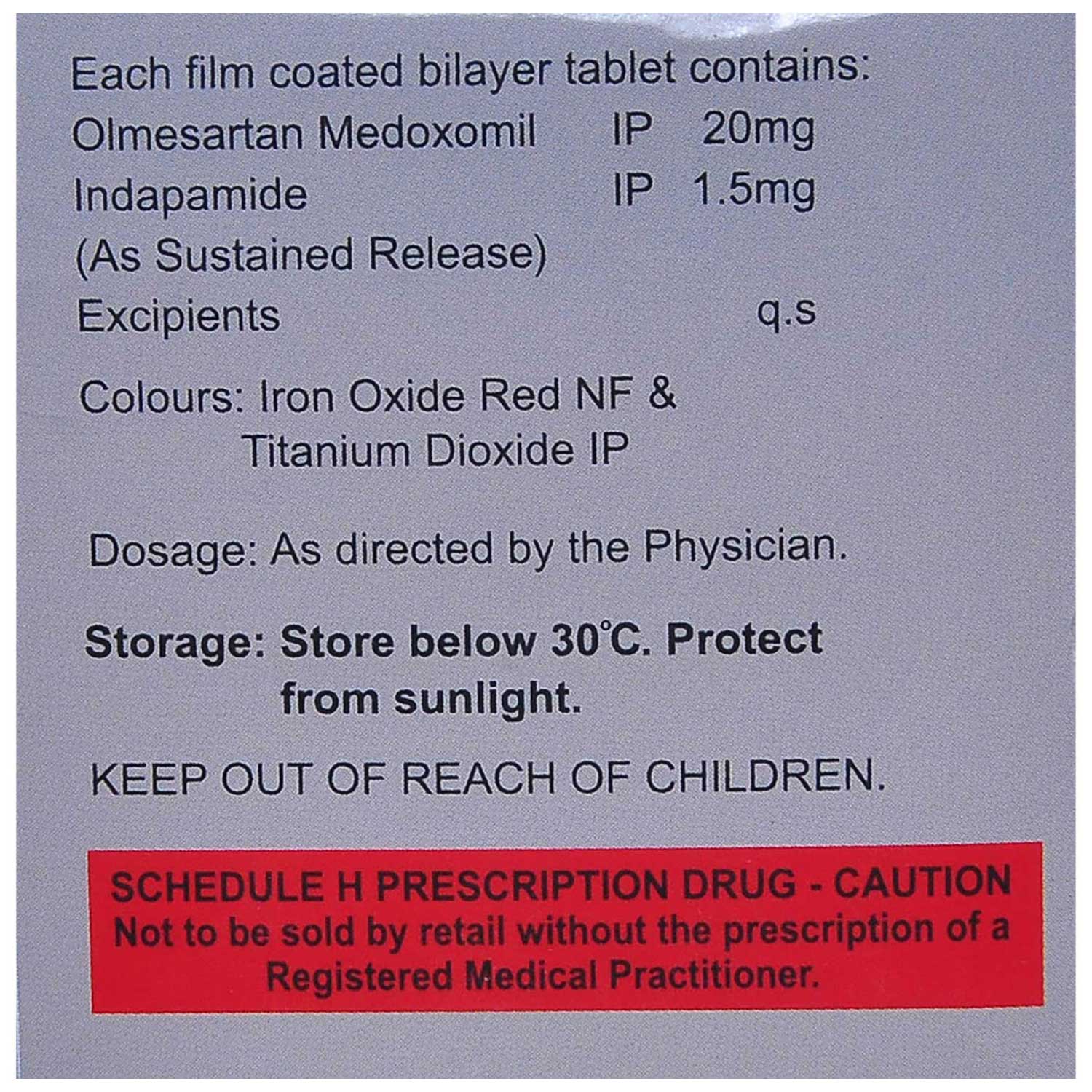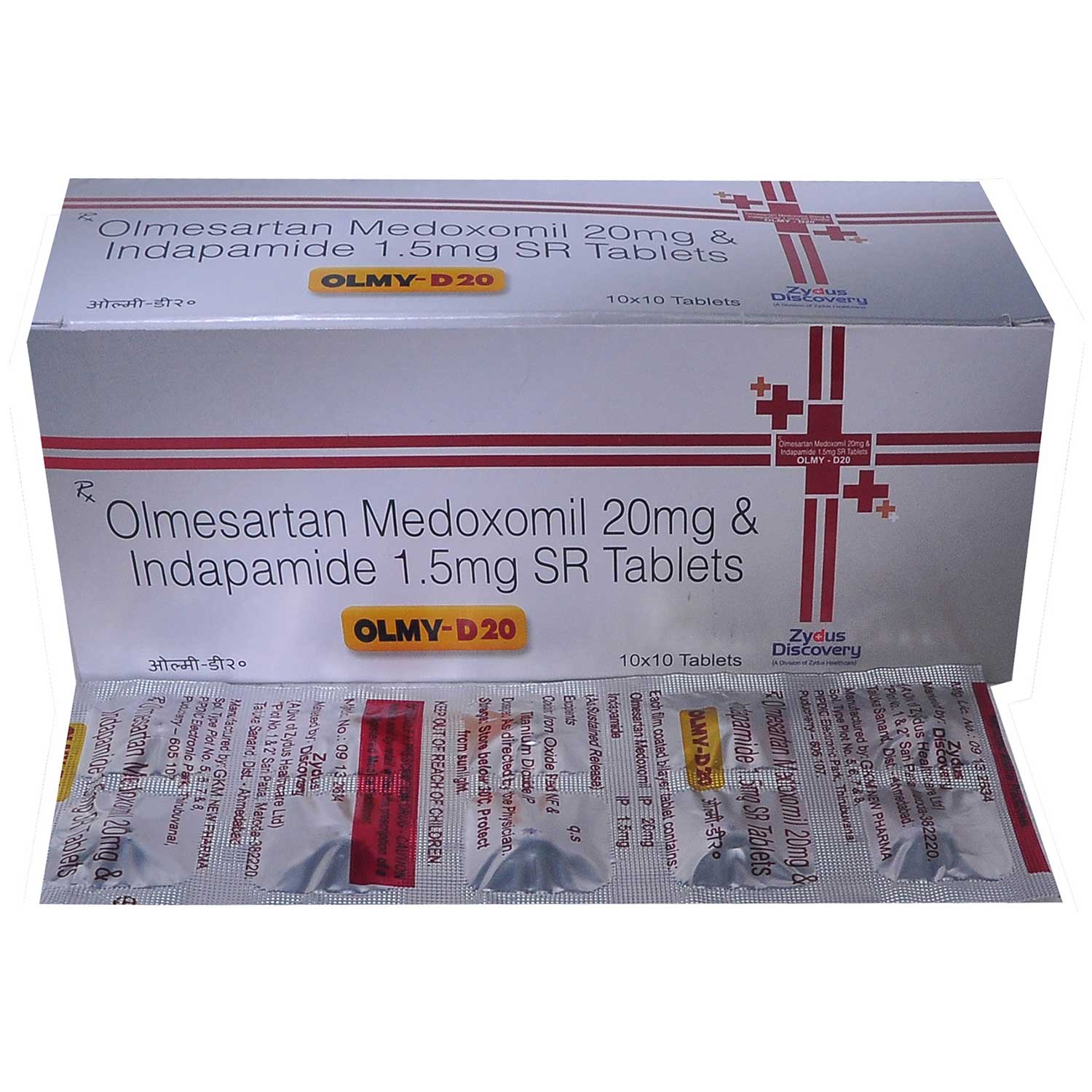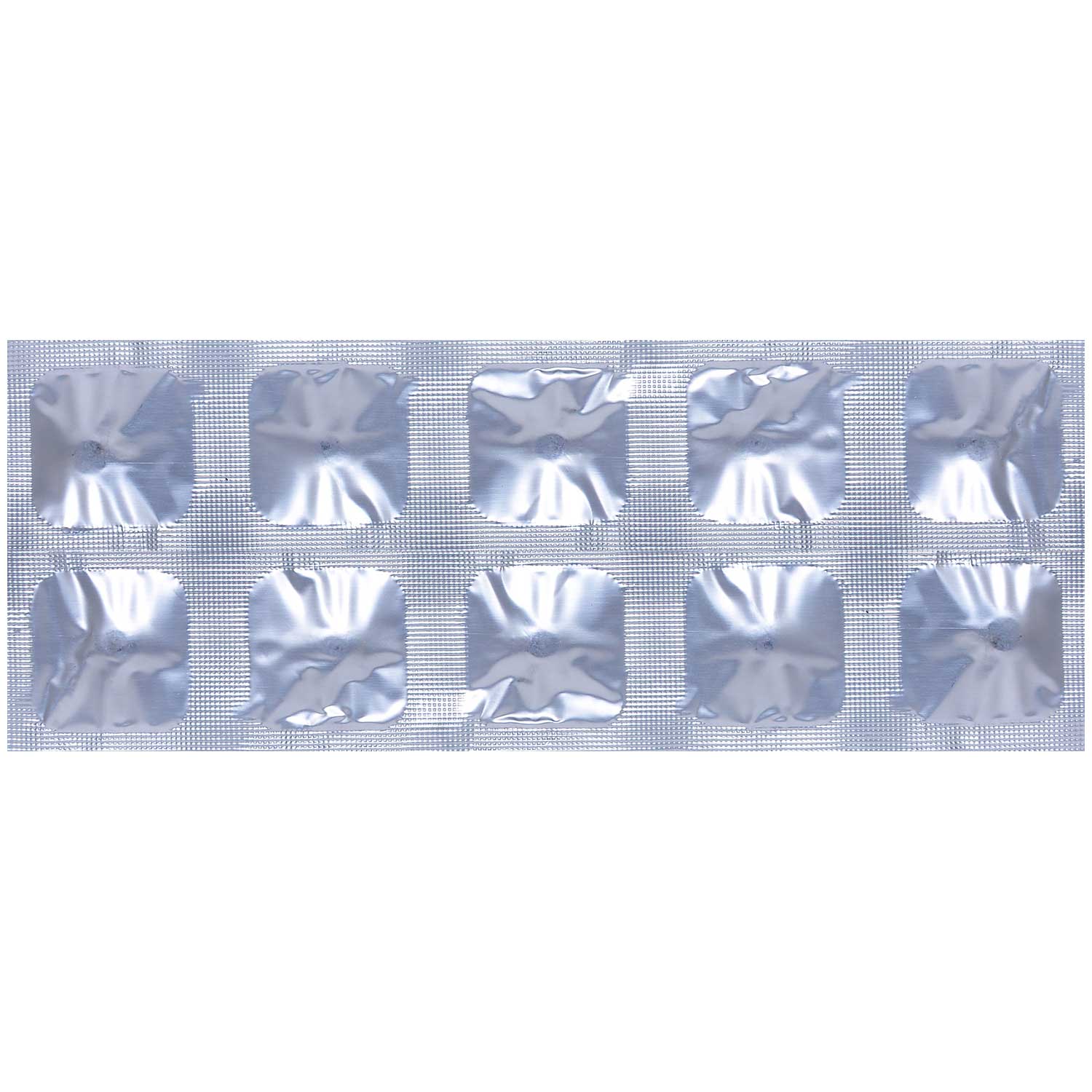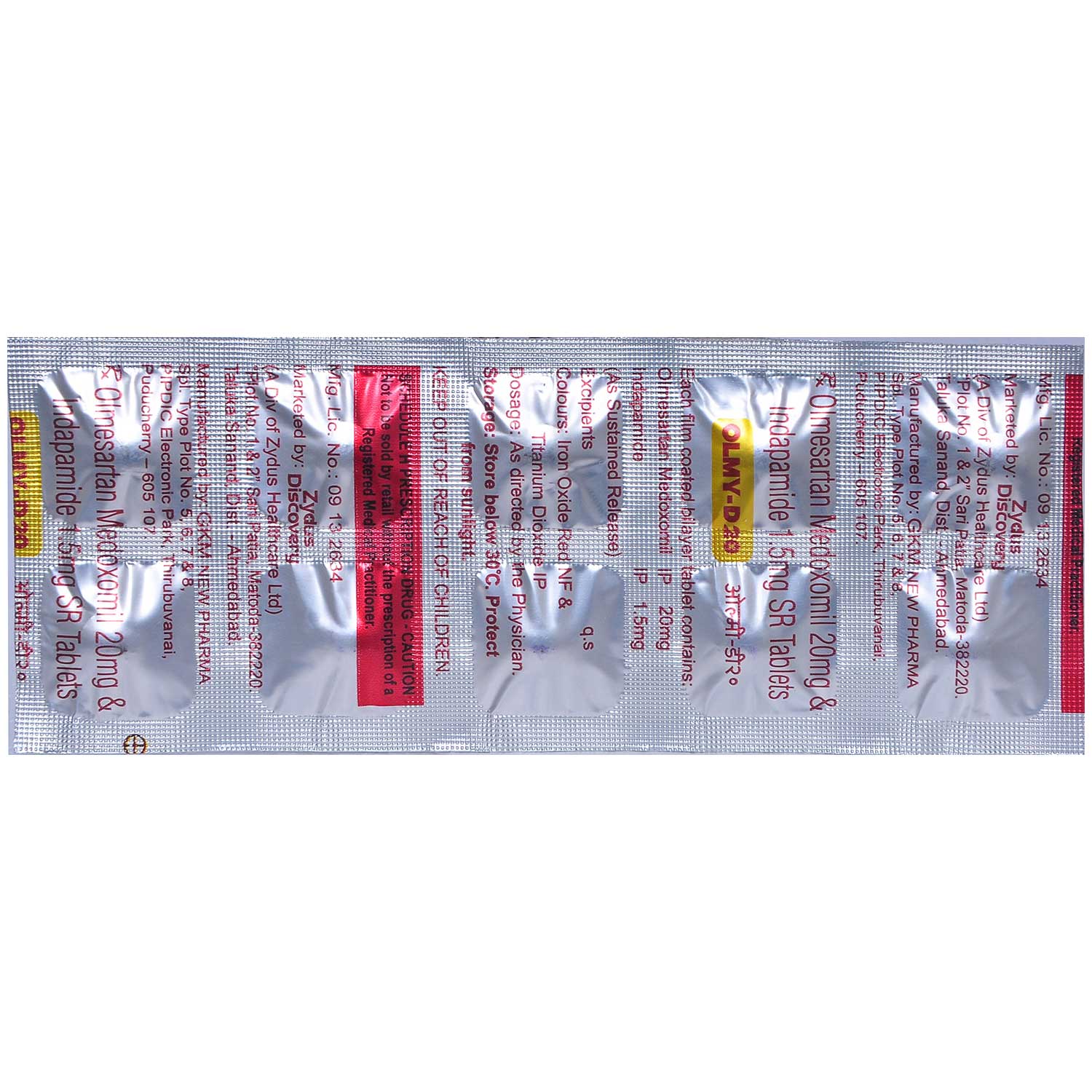Olmy-D 20 Tablet 10's
MRP ₹209.5
(Inclusive of all Taxes)
₹31.4 Cashback (15%)
Provide Delivery Location
Online payment accepted
 Prescription drug
Prescription drugWhats That
 56 people bought
56 people bought Composition :
Manufacturer/Marketer :
Consume Type :
Expires on or after :
Return Policy :
About Olmy-D 20 Tablet
Olmy-D 20 Tablet is a combination of blood pressure-lowering medicine (Olmesartan Medoxomil) and water pills or diuretics (Indapamide) primarily used to treat high blood pressure. Hypertension or high blood pressure is a chronic condition in which the force exerted by the blood against the artery wall increases. As a result, it leads to heart disease, irregular heartbeat, and other complications.
Olmy-D 20 Tablet is a combination of two medicines: Olmesartan Medoxomil and Indapamide. Olmesartan is an angiotensin receptor blocker (ARB) that works by blocking the hormone angiotensin, thereby relaxing blood vessels. This allows the blood to flow more smoothly and the heart to pump more efficiently. Indapamide is a diuretic or water pill that removes extra water and certain electrolytes from the body. Together it lowers fluid overload and blood pressure and improves blood flow.
You can take Olmy-D 20 Tablet with food or without food. It should be swallowed whole with a glass of water. Do not chew, bite, or break it. Your doctor will advise you on how often you take your tablets based on your medical condition. In some cases, you may experience headaches, nausea, or dizziness. Most of these side effects of Olmy-D 20 Tablet do not require medical attention and gradually resolve over time. However, if the side effects are persistent, reach out to your doctor.
Try not to stop taking this medicine of your own. Let your doctor know about this, as it may cause a rise in blood pressure and can increase the risk of heart disease and stroke. Inform your doctor if you are suffering from kidney, liver, heart disease, or diabetes. If you are pregnant or breastfeeding, please tell your doctor so that the dosage of Olmy-D 20 Tablet can be prescribed accordingly. Do not use the Olmy-D 20 Tablet if you cannot urinate, are dehydrated, have low blood pressure (hypotension), or have a cardiogenic shock (sudden stopping blood flow to the heart). Please tell your doctor if you are taking any other medicines or are allergic to this medicine. Reducing the amount of table salt (sodium chloride) in your food often relieves the swelling of the body.
Uses of Olmy-D 20 Tablet
Directions for Use
Key Benefits
Olmy-D 20 Tablet is a combination medication, generally used when a single medicine is ineffective in controlling blood pressure. Olmy-D 20 Tablet is used to treat hypertension, whereas Olmesartan Medoxomil works by relaxing the blood vessels. On the other hand, Indapamide, a diuretic, works by increasing the amount of urine passed out from the kidneys, lowering blood pressure. Together it lowers the overall raised blood pressure and reduces the risk of heart attack, stroke, or kidney problems.
Storage
- Inform your doctor about dizziness symptoms. They may adjust your medication regimen or prescribe additional medications to manage symptoms.
- Follow your doctor's instructions for taking medication, and take it at the same time every day to minimize dizziness.
- When standing up, do so slowly and carefully to avoid sudden dizziness.
- Avoid making sudden movements, such as turning or bending quickly, which can exacerbate dizziness.
- Drink plenty of water throughout the day to stay hydrated and help alleviate dizziness symptoms.
- If you're feeling dizzy, sit or lie down and rest until the dizziness passes.
- Track when dizziness occurs and any factors that may trigger it, and share this information with your doctor to help manage symptoms.
- If you experience symptoms like coughing, wheezing, chest tightness, or difficulty breathing after taking medication, seek medical attention immediately.
- Your healthcare provider will work with you to stop the medication causing the reaction, start alternative treatments, and provide supportive therapy.
- To manage symptoms and prevent complications, follow your doctor's advice to use inhalers or nebulizers as prescribed, practice good hygiene, avoid irritants, stay hydrated, and get plenty of rest.
- Regularly track your symptoms and report any changes or concerns to your healthcare provider.
- Inform Your Doctor: Notify your doctor immediately about your diarrhoea symptoms. This allows them to adjust your medication or provide guidance on managing side effects.
- Stay Hydrated: Drink plenty of fluids to replace lost water and electrolytes. Choose water, clear broth, and electrolyte-rich drinks. Avoid carbonated or caffeinated beverages to effectively rehydrate your body.
- Follow a Bland Diet: Eat easy-to-digest foods to help firm up your stool and settle your stomach. Try incorporating bananas, rice, applesauce, toast, plain crackers, and boiled vegetables into your diet.
- Avoid Trigger Foods: Steer clear of foods that can worsen diarrhoea, such as spicy, fatty, or greasy foods, high-fibre foods, and dairy products (especially if you're lactose intolerant).
- Practice Good Hygiene: Maintain good hygiene to prevent the spread of infection. To stay healthy, wash your hands frequently, clean and disinfect surfaces regularly, and avoid exchanging personal belongings with others.
- Take Anti-Diarrheal Medications: If your doctor advises, anti-diarrheal medications such as loperamide might help manage diarrhoea symptoms. Always follow your doctor's directions.
- Keep track of your diarrhoea symptoms. If they don't get better or worse or are accompanied by severe stomach pain, blood, or dehydration signs (like extreme thirst or dark urine), seek medical help.
- Talk to your doctor about your back pain and potential medication substitutes or dose changes.
- Try yoga or Pilates and other mild stretching exercises to increase flexibility and strengthen your back muscles.
- To lessen the tension on your back, sit and stand upright and maintain proper posture.
- To alleviate discomfort and minimize inflammation, apply heat or cold packs to the afflicted area.
- Under your doctor's supervision, think about taking over-the-counter painkillers like acetaminophen or ibuprofen.
- Make ergonomic adjustments to your workspace and daily activities to reduce strain on your back.
- To handle tension that could make back pain worse, try stress-reduction methods like deep breathing or meditation.
- Use pillows and a supportive mattress to keep your spine in the right posture as you sleep.
- Back discomfort can worsen by bending, twisting, and heavy lifting.
- Speak with a physical therapist to create a customized training regimen to increase back strength and flexibility.
- Limit fried foods and red meat.
- Increase your intake of whole foods such as vegetables, fruits, tree nuts and beans.
- Avoid air pollutants and unhealthy foods.
- Drink lots of water to detoxify your liver.
- Exercise regularly.
- Inform your doctor about the medication you're taking and the UTI symptoms you're experiencing.
- Your doctor may adjust your medication regimen or consider alternative medications or dosages that may reduce the risk of UTIs.
- Drink plenty of water (at least 8-10 glasses a day) to help flush out bacteria. Avoid sugary drinks and caffeine, which can exacerbate UTI symptoms.
- Urinate when you feel the need rather than holding it in. This can help prevent bacterial growth and reduce the risk of UTIs.
- Consider cranberry supplements: Cranberry supplements may help prevent UTIs by preventing bacterial adhesion.
- Monitor UTI symptoms and report any changes to your doctor.
- If antibiotics are prescribed, take them as directed and complete the full course.
- Inform your doctor about your anxiety symptoms so that you doctor may explore potential drug interactions and alter your treatment plan.
- Work with your doctor to adjust your medication regimen or dosage to minimize anxiety symptoms.
- Reduce anxiety symptoms by practicing relaxation techniques like meditation, deep breathing, or yoga.
- Regular self-care activities, such as exercise, healthy food, and adequate sleep, can assist control anxiety.
- Surround yourself with a supportive network of friends, family, or a support group to help manage anxiety and stay motivated.
- Regularly track anxiety symptoms and report any changes to your doctor to ensure your treatment plan is effective and adjusted as needed.
Drug Warnings
It is recommended not to use if you are allergic to any component present in the Olmy-D 20 Tablet . Inform your doctor if you have low blood pressure (less than 90 mm of Hg), have had a heart attack, kidney disease, or liver disease, are pregnant women, or planning to get pregnant and breastfeed women. Besides this, it is contraindicated in low blood pressure (hypotension), cardiogenic shock (sudden stopping of blood flow to the heart), and aortic stenosis (heart valve problem). Olmy-D 20 Tablet can pass into breast milk, but its effect on the baby is unknown. So, it is better to tell your doctor if you take Olmy-D 20 Tablet and breastfeeding.
Drug-Drug Interactions
Drug-Drug Interactions
Login/Sign Up
Using aliskiren together with olmesartan may increase the risk of serious side effects (kidney problems, low blood pressure, and high potassium levels in the blood).
How to manage the interaction:
Taking Olmy-D 20 Tablet with Aliskiren is not recommended as it can cause an interaction, they can be taken if advised by a doctor. You should seek medical attention if you experience nausea, vomiting, weakness, confusion, tingling of the hands and feet, feelings of heaviness in the legs, a weak pulse, or a slow or irregular heartbeat.It is crucial that you continue to consume enough fluids while taking these medications. Do not stop using any medications without consulting a doctor.
Taking Droperidol with Olmy-D 20 Tablet can lead to severe heart problems.
How to manage the interaction:
Taking Droperidol with Olmy-D 20 Tablet is not recommended, but can be taken if prescribed by the doctor.
Taking Protriptyline along with Olmy-D 20 Tablet can lead to serious heart problems.
How to manage the interaction:
Taking Protriptyline with Olmy-D 20 Tablet is not recommended, but can be taken if prescribed by the doctor.
Taking Olmy-D 20 Tablet with Thioridazine can increase the risk of heart problems.
How to manage the interaction:
Taking Thioridazine with Olmy-D 20 Tablet is not recommended, but can be taken if prescribed by the doctor.
Using Olmy-D 20 Tablet with Potassium chloride may increase Potassium levels in the blood.
How to manage the interaction:
Although taking Olmy-D 20 Tablet together with Potassium chloride may lead to an interaction but can be taken if prescribed by the doctor. However, consult the doctor if you experience nausea, vomiting, weakness, disorientation, tingling in your hands and feet, feelings of heaviness in your legs, a weak pulse, or a slow or irregular heartbeat. It is important to maintain proper fluid intake while taking these medications. Do not stop using any medications without talking to a doctor.
Coadministration of Olmy-D 20 Tablet with potassium iodide may increase potassium levels in the blood. (High potassium levels can cause hyperkalemia, which can lead to kidney failure, muscular paralysis, abnormal heart rhythm, and cardiac arrest in extreme cases).
How to manage the interaction:
Although taking Olmy-D 20 Tablet together with potassium iodide may lead to an interaction but can be taken if prescribed by the doctor. However, consult the doctor if you experience nausea, vomiting, weakness, disorientation, tingling in your hands and feet, feelings of heaviness in your legs, a weak pulse, or a slow or irregular heartbeat. It is important to maintain proper fluid intake while taking these medications. Do not stop using any medications without talking to a doctor.
Taking Olmy-D 20 Tablet with trimethoprim may increase potassium levels in the blood.
How to manage the interaction:
Although taking Olmy-D 20 Tablet with trimethoprim may lead to an interaction but can be taken if prescribed by the doctor. However, consult the doctor if you experience nausea, vomiting, weakness, disorientation, tingling in your hands and feet, feelings of heaviness in your legs, a weak pulse, or a slow or irregular heartbeat. Do not stop using any medications without talking to a doctor.
Olmy-D 20 Tablet when combined with benazepril may cause low blood pressure, kidney problems, and may increase potassium levels in the blood.
How to manage the interaction:
Although taking Olmy-D 20 Tablet with benazepril may lead to an interaction but can be taken if prescribed by the doctor. However, consult the doctor if you experience nausea, vomiting, weakness, disorientation, tingling in your hands and feet, feelings of heaviness in your legs, a weak pulse, or a slow or irregular heartbeat. Do not stop using any medications without talking to a doctor.
Taking lithium with Olmy-D 20 Tablet may significantly increase the blood levels of lithium .
How to manage the interaction:
Although taking Olmy-D 20 Tablet alongside lithium can lead to interaction, they can be taken if prescribed by a doctor. However, if you develop sleepiness, dizziness, confusion, loose stools, vomiting, muscular weakness, muscle incoordination, a shaking sensation, blurred vision, ringing in the ears, excessive thirst, and/or increased urination, consult a doctor. Do not stop using any medications without talking to a doctor.
Taking Olmy-D 20 Tablet with triamterene may increase potassium levels in the blood. (High potassium levels can cause hyperkalemia, which can lead to kidney failure, muscular paralysis, abnormal heart rhythm, and cardiac arrest in extreme cases).
How to manage the interaction:
Although taking Olmy-D 20 Tablet with triamterene may lead to an interaction but can be taken if prescribed by the doctor. However, consult the doctor if you experience nausea, vomiting, weakness, disorientation, tingling in your hands and feet, feelings of heaviness in your legs, a weak pulse, or a slow or irregular heartbeat. Do not stop using any medications without talking to a doctor.
Drug-Food Interactions
Drug-Food Interactions
Login/Sign Up
Lentils, Orange Juice, Oranges, Raisins, Potatoes, Salmon Dried, Spinach, Tomatoes, Sweet Potatoes, Coconut Water, Beans, Beetroot, Broccoli, Bananas, Apricots, Avocado, Yogurt
How to manage the interaction:
Coadministration of potassium-containing salt substitutes with Olmesartan medoxomil and Indapamide may cause high levels of potassium in the blood. Avoid potassium-containing salt substitutes while being treated with Olmesartan medoxomil and Indapamide.
Diet & Lifestyle Advise
- Keep your weight under control with a BMI of 19.5-24.9.
- Regular physical activity or exercise for at least 150 minutes per week, or about 30 minutes most days of the
- week. Doing this can help lower your raised blood pressure by about 5 mm Hg.
- Opt for a diet rich in whole grains, fruits, veggies, and low-fat dairy products.
- Limit sodium chloride (table salt) intake in your daily diet to 2300 mg per day or less than 1500 mg is ideal for
- most adults.
- If you are taking alcohol, then only one serving for women and two servings for men is advisable.
- Quitting smoking is the best strategy to lower the risk of heart disease.
- Avoid chronic stress, as it can raise your blood pressure. Try to enjoy and spend time with your loved ones to cope
- with stress and practice mindfulness techniques.
- Monitor your blood pressure daily and if there is too much fluctuation, immediately contact your doctor.
- Try to include heart-healthy omega-3 fatty acids-containing food drinks in your daily diet. You can also use low-fat
- cooking oil like olive oil, soybean oil, canola oil, and coconut oil can help lower your elevated blood pressure.
Side Effects of Olmy-D 20 Tablet
- Bradycardia (slow heart rate)
- Cold extremities
- Drowsiness
- Gastrointestinal disturbances
- Nausea
- Fatigue
Habit Forming
Therapeutic Class
All Substitutes & Brand Comparisons
Drug-Diseases Interactions
Drug-Diseases Interactions
Login/Sign Up
FAQs
Usually, Olmy-D 20 Tablet is safe to prescribe to elderly patients as no overall difference in safety and efficacy of the medicine is found.
Olmy-D 20 Tablet should only be taken if prescribed by the doctor as they may advise this medicine after checking all the medical conditions of the patient. If required they will adjust the dosage.
Certain factors can cause high blood pressure, like obesity, age, genetics, inactivity and poor diet.
There are several serious health conditions associated with high blood pressure including Atherosclerosis (buildup of or fatty material inside walls of the blood vessels), Heart Disease, Kidney Disease, and Eye Disease. Thus, itis important to maintain normal blood pressure to avoid such risks.
Blood pressure is the physical force exerted by blood against the blood vessels. Each time the heart beats, the heart pumps blood into arteries.
Blood pressure changes up and down depending on your activities, as blood pressure becomes high during exercise. Even blood pressure is high during the day than at night. Bloodpressureincreasewith age particularly tends to go up as we grow old.
Hypertension or high blood pressure is a lifelong disease that can be managed effectively with treatment withOlmy-D 20 Tablet , and make some modifications in lifestyle. However, if treatment is stopped, it will return reasonably quickly.
Taking Olmy-D 20 Tablet may cause dehydration. So, to avoid dehydration, drink plenty of fluids, and inform your doctor if you feel extremely thirsty.
It's unlikely that Olmy-D 20 Tablet affects fertility in men or women. However, some water pills like hydrochlorothiazide may lead to erectile dysfunction. There's not enough evidence to say for certain. For the best advice, consult your doctor.
Try not to skip a dose in the first place. However, if you have missed a dose of Olmy-D 20 Tablet , you are advised to take it as soon as you remember. If it's time for you to take your next dose, then do not take both doses together. Take only one dose. Taking a double dose of Olmy-D 20 Tablet will lead to low blood pressure.
Olmy-D 20 Tablet can be safely taken as long as your doctor prescribes it. Conditions such as high blood pressure are life-long conditions, and one should not abruptly discontinue it without discussing it with a doctor.
You are advised not to inform your doctor and monitor your blood pressure for at least two weeks before stopping the medicine. Depending upon your current blood pressure readings, there is a possibility your doctor may lower your medicine dosage and not recommend discontinuing it.
Drug-Drug Interactions Checker List
- HYDROCHLOROTHIAZIDE
- CLARITHROMYCIN
- METOPROLOL
- ERYTHROMYCIN
- KETOCONAZOLE
- RAMIPRIL
- IBUPROFEN
- CARBAMAZEPINE
- ASPIRIN
- ITRACONAZOLE
- PRIMIDONE
- PHENOBARBITAL
- RITONAVIR
- RIFAMPICIN
- SIMVASTATIN
- SILDENAFIL
Disease/Condition Glossary
Hypertension: The blood exerts increased pressure on the walls of blood vessels leading to hypertension. High blood pressure is expressed as systolic/diastolic pressure. Systolic pressure is the pressure in the arteries when the heart beats or pumps out blood. Diastolic pressure is the pressure in the arteries between the heartbeats. Blood pressure is measured in millimetres of mercury (mmHg) by a blood pressure monitor called a sphygmomanometer. Some of the symptoms are headache, dizziness, nosebleeds, altered vision, chest pain, weakness, and shortness of breath. However, most of the time, the signs and symptoms of hypertension are none.

Have a query?
Alcohol
Safe if prescribed
You are recommended not to consume alcohol along with Olmy-D 20 Tablet to avoid unpleasant side-effects.
Pregnancy
Consult your doctor
Olmy-D 20 Tablet is recommended to use during pregnancy. However, the doctor may rarely prescribe it in some life-threatening situations if the benefits are more than the potential risks. Please consult your doctor.
Breast Feeding
Consult your doctor
Let your doctor know if you are a nursing mother before taking Olmy-D 20 Tablet ; your doctor will decide whether Olmy-D 20 Tablet can be taken by breastfeeding mothers or not.
Driving
Safe if prescribed
Driving after taking Olmy-D 20 Tablet is not recommended as it may occasionally cause drowsiness or fatigue.
Liver
Consult your doctor
Olmy-D 20 Tablet to be taken with caution, especially if you have a history of liver diseases/conditions. The dose may have to be adjusted by your doctor.
Kidney
Consult your doctor
Olmy-D 20 Tablet to be taken with caution, especially if you have a history of kidney diseases/conditions. The dose may have to be adjusted by your doctor.
Children
Safe if prescribed
Use of Olmy-D 20 Tablet in children less than 1 year of age is not recommended as the safety and efficacy of Olmy-D 20 Tablet in these age groups have not yet been established.

